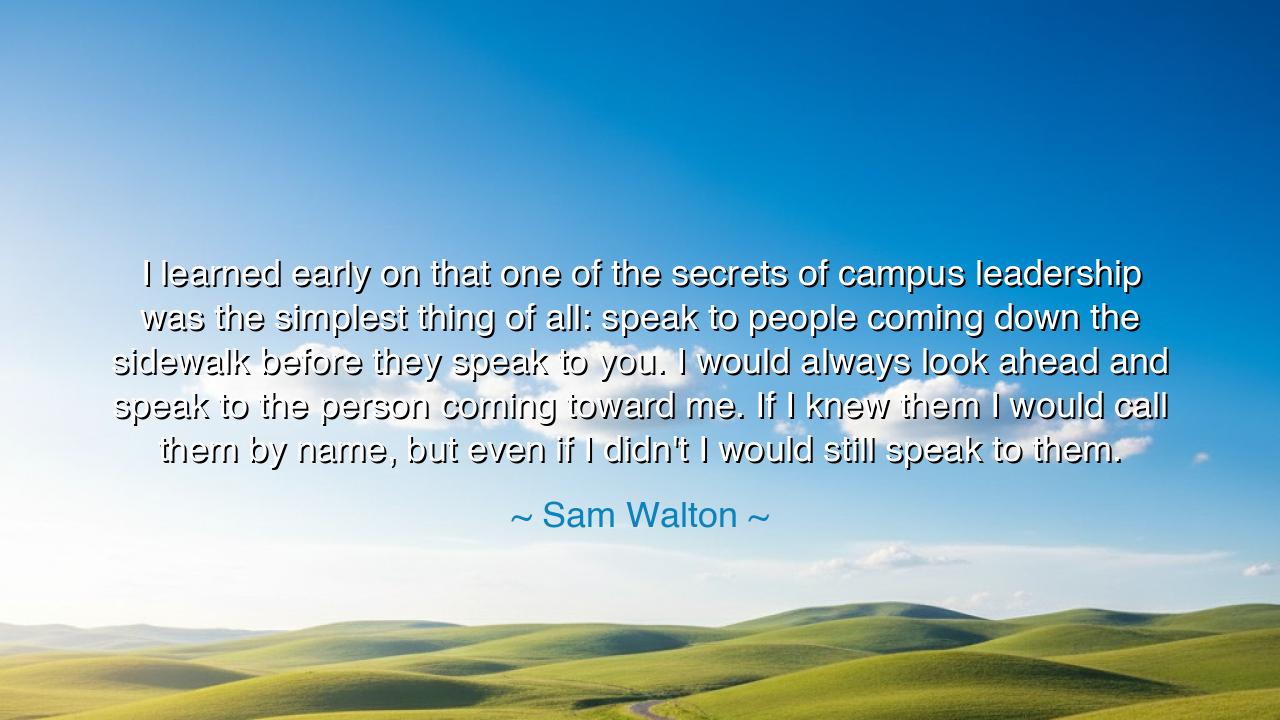
I learned early on that one of the secrets of campus leadership
I learned early on that one of the secrets of campus leadership was the simplest thing of all: speak to people coming down the sidewalk before they speak to you. I would always look ahead and speak to the person coming toward me. If I knew them I would call them by name, but even if I didn't I would still speak to them.






Sam Walton, the builder of an empire and yet a servant at heart, once declared: “I learned early on that one of the secrets of campus leadership was the simplest thing of all: speak to people coming down the sidewalk before they speak to you. I would always look ahead and speak to the person coming toward me. If I knew them I would call them by name, but even if I didn’t I would still speak to them.” In this humble memory lies a truth older than kingdoms: that greatness is not founded on wealth, titles, or power, but on the ability to see others, to acknowledge their humanity, and to extend the first hand of fellowship.
The origin of these words rests in Walton’s youth, when he discovered that the seeds of leadership were sown not in grand gestures, but in simple acts of kindness. On the sidewalks of his campus, he realized that to recognize another person—to greet them first, to honor them by name, or at least by a word—was to build bridges of trust. In this small act, he found the power to inspire loyalty, to make people feel seen, and to create a sense of belonging. Such lessons, simple yet profound, later became the foundation of his empire, for he led not with distance but with approachability.
The ancients, too, recognized this principle. In the Analects, Confucius taught that the gentleman must be courteous, for civility is the first step toward harmony. Alexander the Great, though a conqueror of nations, was known to remember the names of his soldiers, and by this, he won their devotion. To speak first is not merely politeness; it is an act of leadership, a declaration that you are not above others but among them, walking the same road, meeting their eyes with respect.
Consider the story of Abraham Lincoln, who during the Civil War would visit hospitals, greeting soldiers one by one. Even when he did not know their names, he offered them words of encouragement. In those small greetings lay his true greatness. He was not only president but a fellow man, reaching across pain and distance with recognition. His example, like Walton’s words, reminds us that the strongest bonds are often forged not by command but by compassion.
The deeper meaning of Walton’s teaching is that leadership begins not with strategy, but with connection. To speak first is to take responsibility for the atmosphere around you. It is to create a culture of openness, of warmth, of respect. In the workplace, in communities, in families, the one who greets first sets the tone. They transform strangers into companions, subordinates into partners, and organizations into families. Thus, the first word is not small—it is the spark of unity.
The lesson for us is powerful: do not underestimate the power of acknowledgment. A smile, a greeting, a person’s name remembered—these are not trivial courtesies but the bricks of leadership. To greet another first is to affirm their worth, to say, “You matter enough for me to notice you.” In this world, where many feel invisible, such an act is not small kindness but holy work.
Practical action lies within reach of every soul. Each day, make it your habit to speak to others before they speak to you. In the streets, in your workplace, in your school, greet people warmly. Learn and use their names whenever you can, for a person’s name is the sweetest music to their ear. Let this practice shape your character, until people know you not for what you own but for how you make them feel. For this is the essence of leadership: not dominance, but recognition; not distance, but connection.
Thus, Sam Walton’s words, simple as a sidewalk greeting, stand as eternal wisdom: to speak first, to honor others by name, and to treat every encounter as an opportunity for dignity. From such small gestures arise loyalty, respect, and the bonds that build nations and enterprises alike. Let us then pass this teaching down, that the leaders of tomorrow may know the first step toward greatness is not a throne, but a greeting.






AAdministratorAdministrator
Welcome, honored guests. Please leave a comment, we will respond soon